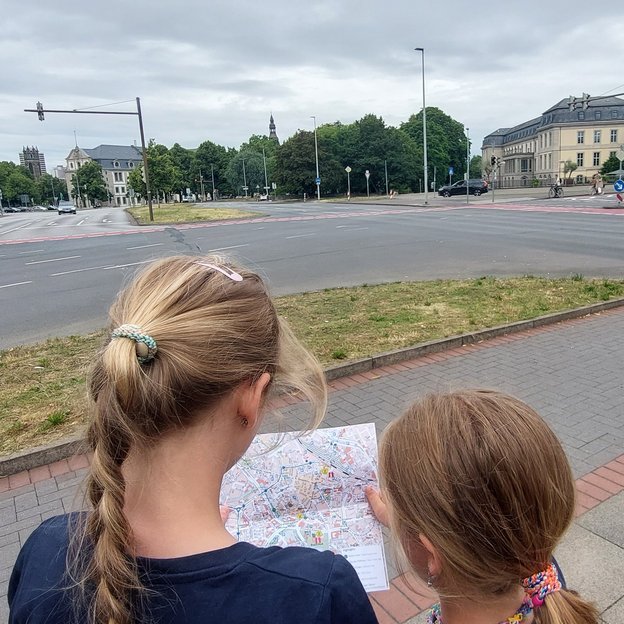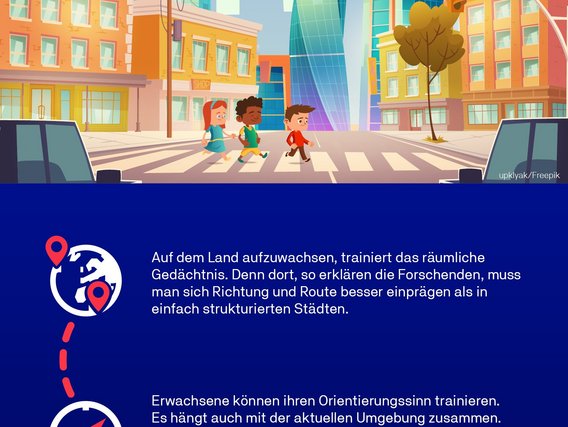Gute Orientierung wurzelt in der Kindheit


The home is the training ground for spatial orientation in adulthood. “We find our way around a new environment better if it resembles the place of our childhood,” says Katrin Müller, a psychologist with a doctorate from TÜV NORD.
Manhattan and Mannheim city center have something in common: the blocks of houses form a kind of chessboard. This means that most of the streets run largely parallel or at right angles to each other. This means that when you are out and about there, you always move along two axes and can easily find your way around.
However, growing up in such simply structured cities can be a disadvantage later on. This is because in a more complex environment, city children find their way around less well as adults than the former children from the countryside. This was the conclusion reached in 2022 by an international team led by neuroscientist Antoine Coutrot from the University of Lyon.
The researchers analyzed data from almost 400,000 people from 38 countries who had played “Sea Hero Quest” on their cell phones in the service of science. In this video game, which was developed solely for research purposes, the test subjects steered a virtual boat and navigated to certain locations. In a second version of the game, called “City Hero Quest”, they completed similar tasks in a virtual city.
It generally helped with orientation if the unknown virtual world had a similarly simple or complex structure to the old home. Navigating on the water - an environment without a clear structure - was also easier for those test subjects who had grown up in the countryside. Moreover, the longer the route to the destination, the better the rural children performed and the worse the urban children performed.

Conclusion: Growing up in the countryside trains spatial memory. According to the researchers, it is easier to memorize directions and routes there than in simply structured cities. However, the differences between urban and rural children were greatest in the USA. Only in a few other countries, such as Canada, was the effect of hometown similarly clear. The advantage for rural children was significantly weaker in Germany and even disappeared completely in Switzerland. In these countries, there are many cities “with a more complex layout”, explain Coutrot and his team. The navigation skills of city children are therefore similarly challenged as those of children from the countryside.
Experiments on mice confirm the special influence of early experiences. How well adult rodents can orient themselves in space also depends on whether they have grown up in cages with complex routing.
But of course, how well we find our way around unfamiliar terrain is not just to do with our childhood. “It also has to do with our current environment,” says Katrin Müller from the Medical-Psychological Institute of TÜV NORD in Düsseldorf. This was shown, for example, in a survey conducted by researchers at LMU Munich in 2019. The almost 800 respondents were asked to indicate how they normally get to their destination. The more rural their current place of residence, the more sophisticated their strategies and the more likely they were to orient themselves by points of the compass rather than by familiar buildings and other landmarks.
And even if a foundation is laid in childhood, such skills are not fixed for all time. “Adults can train their sense of direction,” emphasizes Katrin Müller, who holds a doctorate in psychology. However, this should start as early as possible. A Chinese study found that training “mental rotation”, a classic measure of spatial orientation, was most successful at the age of 18.
You can also practise early on with your own children. Katrin Müller from TÜV NORD recommends: “If the family is out and about together, the children should be allowed to take the lead - without looking at their cell phones, of course.” And if the family gets lost during this exercise, the parents can set a good example and ask for directions.
Founded over 150 years ago, we stand for security and trust worldwide. As a knowledge company, we have our sights firmly set on the digital future. Whether engineers, IT security experts or specialists for the mobility of the future: in more than 100 countries, we ensure that our customers become even more successful in the networked world.